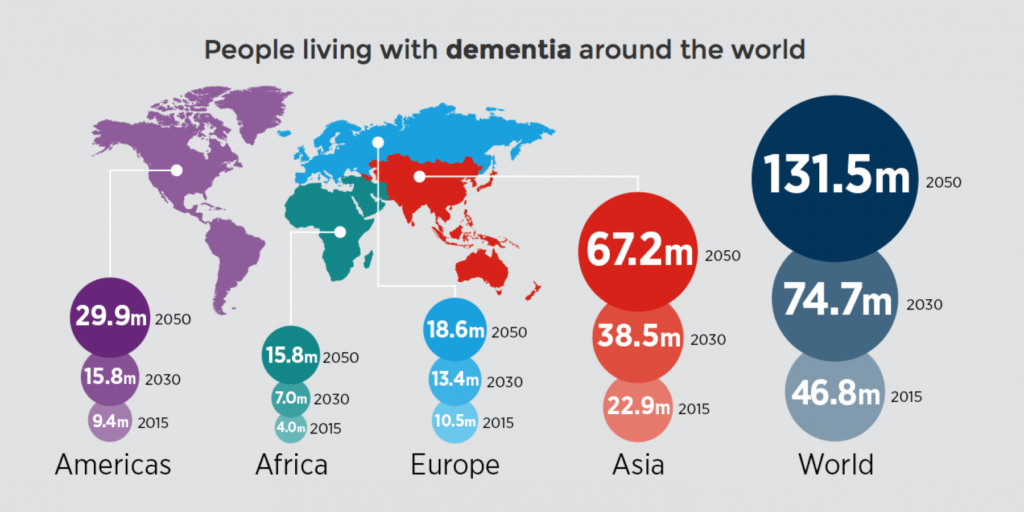Global Impact of Alzheimer’s Disease
Comprehending the Significance and Spread of Alzheimer’s Disease: An International Concern
Alzheimer’s disease is a progressive neurological illness that affects people worldwide and steals both memory and cognitive function. Its effects are felt on a global scale, and its prevalence is expected to increase significantly. This blog explores the epidemiological trends of Alzheimer’s disease and its global reach, emphasising the need for comprehensive remedies.
Table of Contents

The Growing Shadow: Alzheimer’s Disease’s Worldwide Burden
Global Impact of Alzheimer’s Disease
The severity of Alzheimer’s disease alone presents a startling image:
- Startling Statistics: Alzheimer’s disease is a primary cause of dementia, which affects over 55 million people worldwide.
- Unsettling Trend: Because people are living longer, it is predicted that the prevalence of dementia will quadruple by 2050. This means that by the middle of the century, 152 million individuals could be suffering from dementia.
- Inequitable Burden: The greatest increase in cases is anticipated to occur in low- and middle-income nations, placing a burden on their healthcare systems and resources.
These figures provide powerful evidence of the widespread effects of Alzheimer’s disease. It’s not simply a personal battle; it’s a social issue with broad economic ramifications.
Exposing Risk Factors: Which Individuals Are Most at Risk for Alzheimer’s Disease?
Global Impact of Alzheimer’s Disease
It is essential to identify the highest-risk individuals for Alzheimer’s disease in order to create preventative and early intervention strategies:
- Age: Growing older is the biggest risk factor. Although Alzheimer’s can strike at a younger age, the chance rises with increasing life expectancy.
- Genetics: Although it’s not deterministic, a family history raises the risk. Many people without a family history never get the illness.
- Lifestyle Decisions: A number of lifestyle factors, including as smoking, eating an unhealthy diet, not getting enough sleep, and not exercising, raise the risk.
- Fundamental Medical Conditions: Alzheimer’s disease risk is increased in people with diabetes, heart disease, and high blood pressure.
Global Impact of Alzheimer’s Disease
By identifying these risk variables, scientists can create preventative interventions and enable people to make educated lifestyle decisions that may lower their risk.
The Ripple Effect: Alzheimer’s Disease’s Social and Economic Costs
Global Impact of Alzheimer’s Disease
Alzheimer’s affects people in many ways than only how it affects them directly.
- Economic Burden: It is believed that dementia costs the world trillions of dollars every year. This covers the price of medical care, long-term care, and missed wages from taking care of family members.
- Social Impact: As the illness worsens, families and social systems become more unstable. A great deal of mental and physical stress is frequently experienced by carers.
- The Public Health Challenge: Healthcare systems are under stress due to the rising incidence of Alzheimer’s disease: which calls for creative ways to handle this expanding public health emergency.
- Healthcare: governmental organisations, and social support networks must work together to coordinate their efforts in order to address the ramifications for the economy, society, and public health.
Global Initiatives and Research Advancements: A Symbol of Hope
Global Impact of Alzheimer’s Disease
Even with the alarming numbers, there have been encouraging advancements that give hope:
- Enhanced Awareness: Worldwide programmes and campaigns are bringing Alzheimer’s disease to the public’s attention, promoting early diagnosis and financing for research.
- Research Advancements: There is a ray of hope for the future as scientists are actively investigating novel therapies and preventative measures.
- Emphasis on Healthy Ageing: Encouraging brain health programmes and healthy lifestyle choices may lower the risk of Alzheimer’s disease and enhance general wellbeing.
- Promising approaches: to tackling this worldwide issue include funding research, raising awareness, and embracing healthy lifestyle choices.
Final Thoughts: An Appeal for Action
Global Impact of Alzheimer’s Disease
Alzheimer’s disease is a major worldwide problem, yet it is not insurmountable. Through comprehension of the disease’s effects, contributing factors, and current initiatives to address it, we can strive towards a time when this illness no longer has such a lasting impact on people. Everyone can contribute to a better future for those impacted by and living with Alzheimer’s disease by adopting healthy lifestyles, funding research projects, and pushing for better care and support systems. Individuals, communities, and governments all have a part to play in this.


